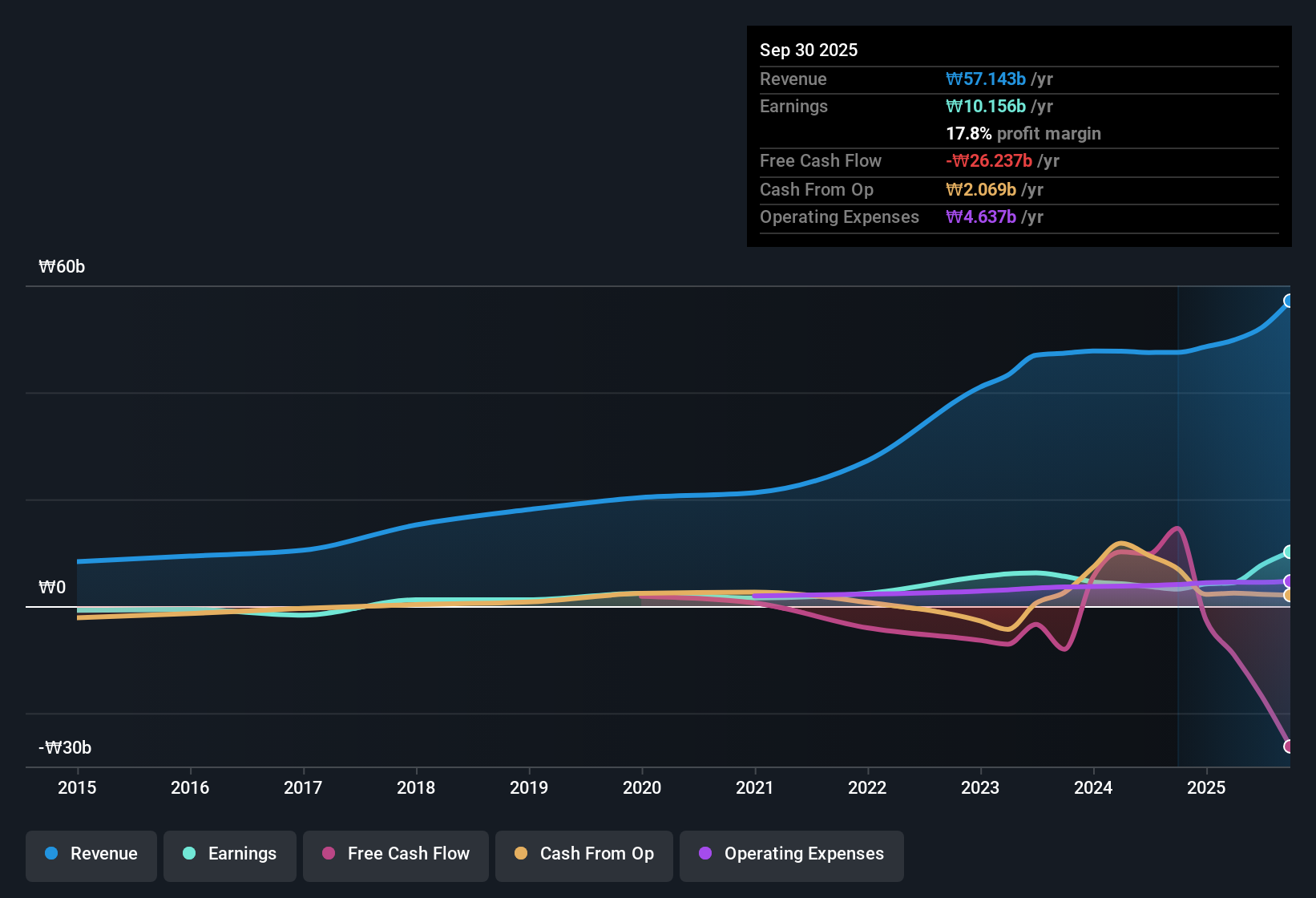- South Korea
- /
- Building
- /
- KOSDAQ:A452280
Additional Considerations Required While Assessing Hansun Engineering's (KOSDAQ:452280) Strong Earnings
Hansun Engineering Co., Ltd. (KOSDAQ:452280) announced strong profits, but the stock was stagnant. We did some digging, and we found some concerning factors in the details.

Examining Cashflow Against Hansun Engineering's Earnings
In high finance, the key ratio used to measure how well a company converts reported profits into free cash flow (FCF) is the accrual ratio (from cashflow). The accrual ratio subtracts the FCF from the profit for a given period, and divides the result by the average operating assets of the company over that time. The ratio shows us how much a company's profit exceeds its FCF.
That means a negative accrual ratio is a good thing, because it shows that the company is bringing in more free cash flow than its profit would suggest. That is not intended to imply we should worry about a positive accrual ratio, but it's worth noting where the accrual ratio is rather high. To quote a 2014 paper by Lewellen and Resutek, "firms with higher accruals tend to be less profitable in the future".
Over the twelve months to September 2025, Hansun Engineering recorded an accrual ratio of 0.51. Statistically speaking, that's a real negative for future earnings. To wit, the company did not generate one whit of free cashflow in that time. Even though it reported a profit of ₩10.2b, a look at free cash flow indicates it actually burnt through ₩26b in the last year. It's worth noting that Hansun Engineering generated positive FCF of ₩15b a year ago, so at least they've done it in the past. The good news for shareholders is that Hansun Engineering's accrual ratio was much better last year, so this year's poor reading might simply be a case of a short term mismatch between profit and FCF. Shareholders should look for improved cashflow relative to profit in the current year, if that is indeed the case.
Note: we always recommend investors check balance sheet strength. Click here to be taken to our balance sheet analysis of Hansun Engineering.
Our Take On Hansun Engineering's Profit Performance
As we discussed above, we think Hansun Engineering's earnings were not supported by free cash flow, which might concern some investors. For this reason, we think that Hansun Engineering's statutory profits may be a bad guide to its underlying earnings power, and might give investors an overly positive impression of the company. The silver lining is that its EPS growth over the last year has been really wonderful, even if it's not a perfect measure. The goal of this article has been to assess how well we can rely on the statutory earnings to reflect the company's potential, but there is plenty more to consider. So if you'd like to dive deeper into this stock, it's crucial to consider any risks it's facing. At Simply Wall St, we found 2 warning signs for Hansun Engineering and we think they deserve your attention.
Today we've zoomed in on a single data point to better understand the nature of Hansun Engineering's profit. But there are plenty of other ways to inform your opinion of a company. For example, many people consider a high return on equity as an indication of favorable business economics, while others like to 'follow the money' and search out stocks that insiders are buying. So you may wish to see this free collection of companies boasting high return on equity, or this list of stocks with high insider ownership.
Valuation is complex, but we're here to simplify it.
Discover if Hansun Engineering might be undervalued or overvalued with our detailed analysis, featuring fair value estimates, potential risks, dividends, insider trades, and its financial condition.
Access Free AnalysisHave feedback on this article? Concerned about the content? Get in touch with us directly. Alternatively, email editorial-team (at) simplywallst.com.
This article by Simply Wall St is general in nature. We provide commentary based on historical data and analyst forecasts only using an unbiased methodology and our articles are not intended to be financial advice. It does not constitute a recommendation to buy or sell any stock, and does not take account of your objectives, or your financial situation. We aim to bring you long-term focused analysis driven by fundamental data. Note that our analysis may not factor in the latest price-sensitive company announcements or qualitative material. Simply Wall St has no position in any stocks mentioned.
About KOSDAQ:A452280
Hansun Engineering
Manufactures and sells tube fittings and valves in South Korea and internationally.
Excellent balance sheet with proven track record.
Market Insights
Community Narratives



